This article consists almost entirely of a plot summary .(September 2024) |


The opera trilogy I, Claudius and Claudius the God is the work of composer Igor Escudero. [1] [2] [3]
This article consists almost entirely of a plot summary .(September 2024) |


The opera trilogy I, Claudius and Claudius the God is the work of composer Igor Escudero. [1] [2] [3]
The three parts, or chapters, that form I, Claudius and Claudius the God are titled Livia, Caligula and Claudius the God, and have been conceived to be performed not only sequentially, but also separately. [4] [5]
Augustus, first emperor and head of the Julio-Claudian family, has led Rome to an era of wide expansion and social and economic growth. Livia, his wife, controls him and runs Rome from the shadows. Through the years she has been slowly getting rid of anyone who dared escape her control, no matter if family or not.
It's been foretold that the Julio-Claudian family will rule Rome for decades. This dynasty has a black sheep, young Claudius, a weak and crippled boy who has a stutter. Despite his kindness and honesty, Claudius is repudiated by almost everyone, including his mother. His brother Germanicus and his friend Postumus, who are both candidates to succeed Augustus as the leaders of Rome, are the only ones who love him.
Livia manipulates Augustus to name her son Tiberius as heir to the throne.
Following Livia's death, Tiberius's depravity is out of control. Rome sinks into a Dark Age, marked by corruption and non-stop executions of citizens. Tiberius's life is close to an end, and Caligula has been chosen to succeed him. Claudius knows that his nephew, Caligula, shares nothing of his father's virtuous nature.
After just a few months of being on the throne, the people of Rome grow tired of Caligula's excesses and eccentricities. Rome plunges into a reign of terror, even worse than that of Tiberius.
Caligula has been murdered by his captain of the Guard, Cassius. His death has left a power vacuum in Rome that the Senate, devoid of any ability to govern on its own after decades of humiliations and the submission, tries to fill by naming Claudius as emperor.
Claudius proves wrong everyone who thought him a fool. He devotes himself to work tirelessly to rebuild everything that his predecessors destroyed. He undertakes social and economic reforms and public works. Leading an army on the battlefield for the first time in his life, Claudius manages to annex and pacify Britain, making it a new Roman province.
Claudius faces challenges. In Jerusalem, Herod, who believes himself the incarnation of the messiah, plans a general uprising in the East. And at home, Claudius doesn't realise that the person he trusts the most is the one who most likely will betray him: his own wife Messalina.
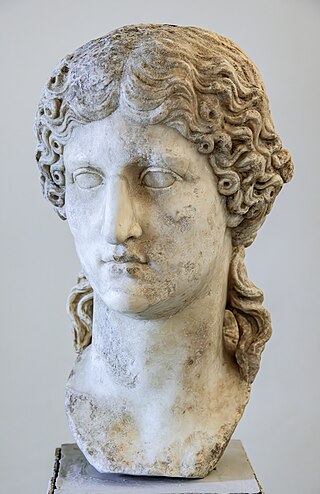
(Vipsania) Agrippina the Elder was a prominent member of the Julio-Claudian dynasty. She was the daughter of Marcus Vipsanius Agrippa and Augustus' daughter, Julia the Elder. Her brothers Lucius and Gaius Caesar were the adoptive sons of Augustus, and were his heirs until their deaths in AD 2 and 4, respectively. Following their deaths, her second cousin Germanicus was made the adoptive son of Tiberius, Augustus' stepson, as part of the succession scheme in the adoptions of AD 4. As a result of the adoption, Agrippina was wed to Germanicus in order to bring him closer to the Julian family.

Julia Agrippina, also referred to as Agrippina the Younger, was Roman empress from AD 49 to 54, the fourth wife and niece of emperor Claudius, and the mother of Nero.

Tiberius Claudius Caesar Augustus Germanicus was a Roman emperor, ruling from AD 41 to 54. A member of the Julio-Claudian dynasty, Claudius was born to Drusus and Antonia Minor at Lugdunum in Roman Gaul, where his father was stationed as a military legate. He was the first Roman emperor to be born outside Italy.

Gaius Caesar Augustus Germanicus, better known by his nickname Caligula, was Roman emperor from AD 37 until his assassination in AD 41. He was the son of the Roman general Germanicus and Augustus' granddaughter Agrippina the Elder, members of the first ruling family of the Roman Empire. He was born two years before Tiberius was made emperor. Gaius accompanied his father, mother and siblings on campaign in Germania, at little more than four or five years old. He had been named after Gaius Julius Caesar, but his father's soldiers affectionately nicknamed him "Caligula".
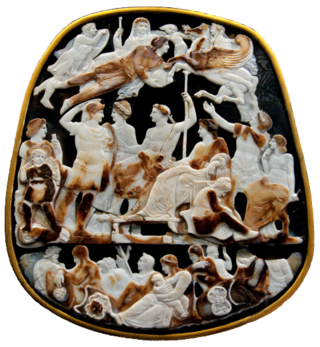
The Julio-Claudian dynasty comprised the first five Roman emperors: Augustus, Tiberius, Caligula, Claudius, and Nero.

Around the start of the Common Era, the family trees of the gens Julia and the gens Claudia became intertwined into the Julio-Claudian family tree as a result of marriages and adoptions.

Tiberius Julius Caesar Augustus was Roman emperor from AD 14 until 37. He succeeded his stepfather Augustus, the first Roman emperor. Tiberius was born in Rome in 42 BC to Roman politician Tiberius Claudius Nero and his wife, Livia Drusilla. In 38 BC, Tiberius's mother divorced his father and married Augustus. Following the untimely deaths of Augustus's two grandsons and adopted heirs, Gaius and Lucius Caesar, Tiberius was designated Augustus's successor. Prior to this, Tiberius had proved himself an able diplomat, and one of the most successful Roman generals: his conquests of Pannonia, Dalmatia, Raetia, and (temporarily) parts of Germania laid the foundations for the empire's northern frontier.
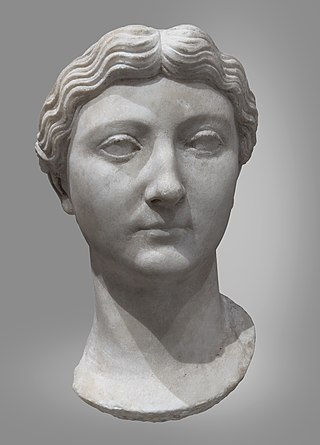
Livia Drusilla was Roman empress from 27 BC to AD 14 as the wife of emperor Augustus. She was known as Julia Augusta after her formal adoption into the Julian family in AD 14.
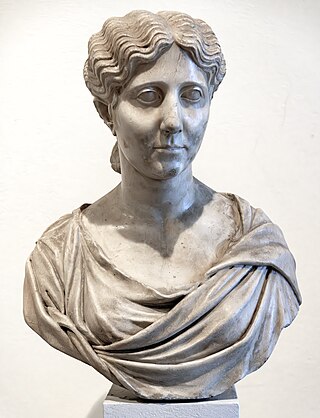
Antonia Minor was the younger of two surviving daughters of Mark Antony and Octavia Minor. She was a niece of the Emperor Augustus, sister-in-law of the Emperor Tiberius, paternal grandmother of the Emperor Caligula and Empress Agrippina the Younger, mother of the Emperor Claudius, and maternal great-grandmother of the Emperor Nero. She outlived her husband Drusus, her oldest son, her daughter, and several of her grandchildren.
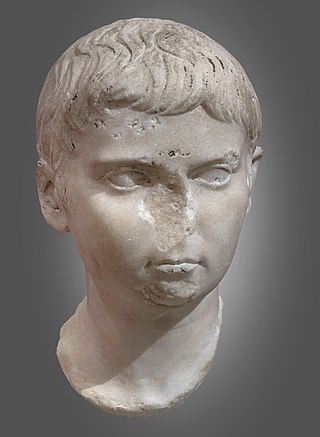
Marcus Agrippa Postumus, later named Agrippa Julius Caesar, was a grandson of Roman Emperor Augustus. He was the youngest child of Marcus Vipsanius Agrippa and Julia the Elder. Augustus initially considered Postumus as a potential successor and formally adopted him as his heir, before banishing Postumus from Rome in AD 6 on account of his ferocia. In effect, though not in law, the action cancelled his adoption and virtually assured Tiberius' emplacement as Augustus' sole heir. Postumus was ultimately executed by his own guards shortly after Augustus' death in AD 14.

I, Claudius is a historical novel by English writer Robert Graves, published in 1934. Written in the form of an autobiography of the Roman Emperor Claudius, it tells the history of the Julio-Claudian dynasty and the early years of the Roman Empire, from Julius Caesar's assassination in 44 BC to Caligula's assassination in AD 41. Though the narrative is largely fictionalized, most of the events depicted are drawn from historical accounts of the same time period by the Roman historians Suetonius and Tacitus.
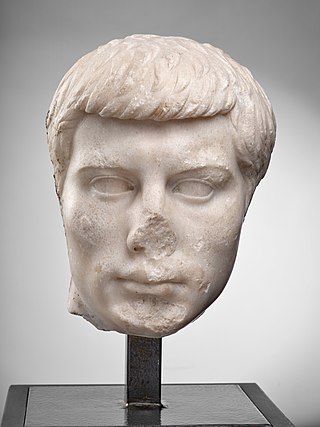
Tiberius Julius Caesar Nero, known as Tiberius Gemellus, was the son of Drusus and Livilla, the grandson of the Emperor Tiberius, and the cousin of the Emperor Caligula. Gemellus is a nickname meaning "the twin". His twin brother, Germanicus Gemellus, died as a young child in AD 23. His father and older cousins died, and are suspected by contemporary sources as having been systematically eliminated by the powerful praetorian prefect Sejanus. Their removal allowed Gemellus and Caligula to be named joint-heirs by Tiberius in 35, a decision that ultimately resulted in Caligula assuming power and having Gemellus killed in late 37 or early 38.

Claudia Livia was the only daughter of Nero Claudius Drusus and Antonia Minor and sister to Roman Emperor Claudius and general Germanicus, and thus paternal aunt of emperor Caligula and maternal great-aunt of emperor Nero, as well as the niece and daughter-in-law of Tiberius. She was named after her grandmother, Augustus' wife Livia Drusilla, and commonly known by her family nickname Livilla. She was born after Germanicus and before Claudius.

Drusus Caesar was the adopted grandson and heir of the Roman emperor Tiberius, alongside his brother Nero. Born into the prominent Julio-Claudian dynasty, Drusus was the son of Tiberius' general and heir, Germanicus. After the deaths of his father and of Tiberius' son, Drusus the Younger, Drusus and his brother Nero Caesar were adopted together by Tiberius in September AD 23. As a result of being heirs of the emperor, he and his brother enjoyed accelerated political careers.

Nero Julius Caesar was the adopted grandson and heir of the Roman emperor Tiberius, alongside his brother Drusus. Born into the prominent Julio-Claudian dynasty, Nero was the son of Tiberius' general and heir, Germanicus. After the deaths of his father and of Tiberius' son, Drusus the Younger, Nero and his brother Drusus were adopted together by Tiberius in September AD 23. As a result of being heirs of the emperor, he and his brother enjoyed accelerated political careers.

Lucius Caesar was a grandson of Augustus, the first Roman emperor. The son of Marcus Vipsanius Agrippa and Julia the Elder, Augustus' only daughter, Lucius was adopted by his grandfather along with his older brother, Gaius Caesar. As the emperor's adopted sons and joint-heirs to the Roman Empire, Lucius and Gaius had promising political and military careers. However, Lucius died of a sudden illness on 20 August 2 AD, in Massilia, Gaul, while traveling to meet the Roman army in Hispania. His brother Gaius also died at a relatively young age on 21 February 4 AD. The untimely loss of both heirs compelled Augustus to redraw the line of succession by adopting Lucius' younger brother, Agrippa Postumus as well as his stepson, Tiberius on 26 June 4 AD.

Julia Livilla was the youngest child of Germanicus and Agrippina the Elder and the youngest sister of the Emperor Caligula.

Octavia the Younger was the elder sister of the first Roman emperor, Augustus, the half-sister of Octavia the Elder, and the fourth wife of Mark Antony. She was also the great-grandmother of the Emperor Caligula and Empress Agrippina the Younger, maternal grandmother of the Emperor Claudius, and paternal great-grandmother and maternal great-great-grandmother of the Emperor Nero.

De vita Caesarum, commonly known as The Twelve Caesars, is a set of twelve biographies of Julius Caesar and the first 11 emperors of the Roman Empire written by Gaius Suetonius Tranquillus. The subjects consist of: Julius Caesar, Augustus, Tiberius, Caligula, Claudius, Nero, Galba, Otho, Vitellius, Vespasian, Titus, Domitian.

Igor Escudero Morais is a Spanish musician, best known as a composer of classical music and opera. He is the author of eleven operas, three musicals, three profane oratorios, concerts, soundtracks for documentaries, OST for audiovisuals and short films, sacred and profane choral music, cantatas and a great variety of chamber pieces.